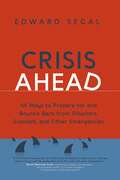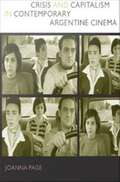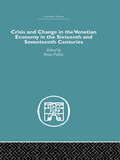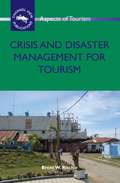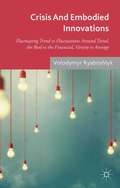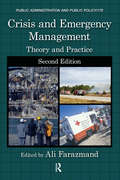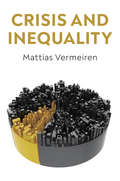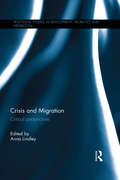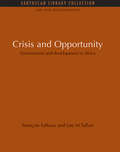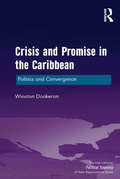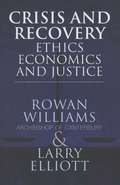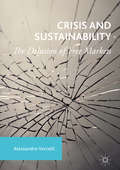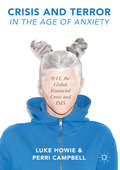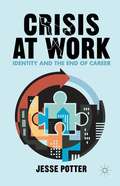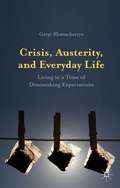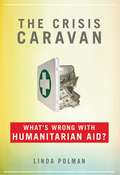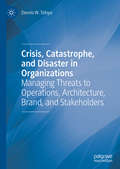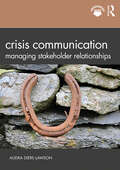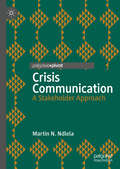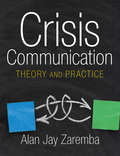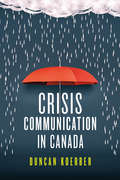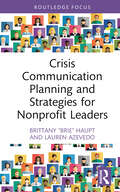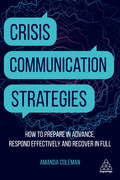- Table View
- List View
Crisis Ahead: 101 Ways to Prepare for and Bounce Back From Disasters, Scandals, and Other Emergencies
by Edward SegalHow many splashy scandals and crisis situations have befallen companies and public figures in the past week alone? How did the organizations and people at the center of those crises manage the situation? Did they survive with their reputations intact or are they facing an ongoing public nightmare that keeps building on itself in the era of social media?This new book from veteran public relations expert Edward Segal is based on the following premise: it's not a matter of IF a scandal or crisis will hit, it's WHEN. How a company deals with it will have lasting impact on their reputation, profits, and more. But for most organizations, when a crisis hits, they're caught off guard and ill-prepared. While essential, crisis plans are worthless unless properly executed, as the stories and examples featured throughout Crisis Ahead attest. Edward Segal's vivid and memorable accounts underscore the benefits of practicing and updating crisis plans at least once a year. The book also provides a template for creating a customizable crisis management plan.Crisis Ahead is for CEOs, senior staff, corporate communication professionals, HR and legal teams, boards of directors, and front-line employees who need to know what to do in the moment: what levers to pull and what moves to make in real time when faced with a crisis, scandal, or disaster. This book is written with the need for speed in mind. It's concise and practical with a light touch and occasional humor to help people on the front lines prepare for, survive, and bounce back from a crisis. It includes dozens of anecdotes, stories, and lessons about how companies, organizations, and individuals - ranging from Amazon, Apple, and the European Union, to Disney, Starbucks, and entrepreneur Elon Musk - have prepared for, created, managed, and communicated about crisis situations.
Crisis and Capitalism in Contemporary Argentine Cinema
by Joanna PageThere has been a significant surge in recent Argentine cinema, with an explosion in the number of films made in the country since the mid-1990s. Many of these productions have been highly acclaimed by critics in Argentina and elsewhere. What makes this boom all the more extraordinary is its coinciding with a period of severe economic crisis and civil unrest in the nation. Offering the first in-depth English-language study of Argentine fiction films of the late twentieth century and early twenty-first, Joanna Page explains how these productions have registered Argentina's experience of capitalism, neoliberalism, and economic crisis. In different ways, the films selected for discussion testify to the social consequences of growing unemployment, rising crime, marginalization, and the expansion of the informal economy. Page focuses particularly on films associated with New Argentine Cinema, but she also discusses highly experimental films and genre movies that borrow from the conventions of crime thrillers, Westerns, and film noir. She analyzes films that have received wide international recognition alongside others that have rarely been shown outside Argentina. What unites all the films she examines is their attention to shifts in subjectivity provoked by political or economic conditions and events. Page emphasizes the paradoxes arising from the circulation of Argentine films within the same global economy they so often critique, and she argues that while Argentine cinema has been intent on narrating the collapse of the nation-state, it has also contributed to the nation's reconstruction. She brings the films into dialogue with a broader range of issues in contemporary film criticism, including the role of national and transnational film studies, theories of subjectivity and spectatorship, and the relationship between private and public spheres.
Crisis and Change in the Venetian Economy in the Sixteenth and Seventeenth Centuries
by Brian PullanThe decline of Venice remains one of the classic episodes in the economic development of modern Europe. Its contrasts are familiar enough: the wealthiest commercial power in fifteenth-century Europe, the strongest western colonial power in the eastern Mediterranean, found its principal fame three centuries later in carnival and the arts. This metamorphosis from commercial hegemony to fashionable pleasure and landed wealth was, however, a complex process. It resulted not so much from the Portuguese voyages of discovery at the beginning of the sixteenth century as from increasing Dutch adn English competition at its end, and from industrial competition chiefly from beyond the Mediterranean. Several of the Articles Dr Pullan has chosen to illustrate these changes are made available in English for the first time, and two have been revised for this book. Four deal with the fortunes of entrepot trade and shipbuilding, which had furnished the basis of Venetian wealth adn influence in the Middle Ages; four others expamine the new fields of enterprise which Venice explored in the sixteenth and seventeenth centuries and which helped to compensate for the decline in traditional activities. This classic book was first published in 1968.
Crisis and Disaster Management for Tourism
by Brent W. RitchieTourism destinations and businesses are becoming increasingly prone to the impacts of crises and disasters due to global environmental change and security risks. This is the first research based book that provides a strategic approach to understanding the nature of tourism crises and disasters before outlining tourism crisis and disaster planning, response, and longer term recovery and knowledge management strategies. It applies a wide range of theoretical perspectives and concepts to improve our understanding of both organisational crises and natural disasters. The book draws on examples from around the world including the USA, Europe, UK, Asia-Pacific and the Middle East. It will be essential reading for tourism academics and students as well as tourism managers and government officials involved in tourism destination management and marketing.
Crisis And Embodied Innovations
by Volodymyr RyaboshlykThis book introduces embodied innovations into the circle of already recognised causes of economic crises. The author shows how issues of investment, accumulation and structural change associated with embodied innovations can be used to monitor potential crisis. The author argues that crises are predictable and manageable in depth.
Crisis and Emergency Management: Theory and Practice, Second Edition (Public Administration and Public Policy #178)
by Ali FarazmandMore than 12 years have passed since the publication of the first edition of Crisis and Emergency Management. During that time numerous disasters—from 9/11 to massive earthquakes in Iran and China, to the giant Asian Tsunami, Hurricane Katrina, and the Fukushima Tsunami and ensuing nuclear meltdown—have changed the way we manage catastrophic events. With contributions from leading experts, this second edition features 40 new chapters that address recent worldwide crises and what we have learned from emergency responses to them. See What’s New in the Second Edition: Up-to-date concepts, theories, and practices Analysis of recent disasters and their effect on emergency management Policy and managerial lessons Suggestions for capacity building in crisis and emergency management The book covers a wide range of international issues using critical, empirical, and quantitative analyses. It discusses various approaches to topics such as resolving political tension and terrorism issues, the potential use of biological weapons, and the role of public relations in crisis. The author offers insight into organizational and community resiliency development; a "surprise management" theory in practice for upgrading the knowledge and skills in managing crises and governing emergencies; and better and more effective organizational, political, social, and managerial coordination in the processes. He presents case studies that enhance and advance the future theory and practice of crisis and emergency management, while at the same time providing practical advice that can be put to use immediately. Managing crises and governing emergencies in such an age of challenges demands a different kind of knowledge, skills, and attitudes that were not available yesterday. This book gives you valuable information with applications at the macro, micro, organizational, and interorganizational levels, preparing you for emergency management in an increasingly globalized and uncertain world.
Crisis and Inequality: The Political Economy of Advanced Capitalism
by Mattias VermeirenSpiralling inequality since the 1970s and the global financial crisis of 2008 have been the two most important challenges to democratic capitalism since the Great Depression. To understand the political economy of contemporary Europe and America we must, therefore, put inequality and crisis at the heart of the picture. In this innovative new textbook Mattias Vermeiren does just this, demonstrating that both the global financial crisis and the European sovereign debt crisis resulted from a mutually reinforcing but ultimately unsustainable relationship between countries with debt-led and export-led growth models, models fundamentally shaped by soaring income and wealth inequality. He traces the emergence of these two growth models by giving a comprehensive overview, deeply informed by the comparative and international political economy literature, of recent developments in the four key domains that have shaped the dynamics of crisis and inequality: macroeconomic policy, social policy, corporate governance and financial policy. He goes on to assess the prospects for the emergence of a more egalitarian and sustainable form of democratic capitalism. This fresh and insightful overview of contemporary Western capitalism will be essential reading for all students and scholars of international and comparative political economy.
Crisis and Migration: Critical Perspectives (Routledge Studies in Development, Mobilities and Migration)
by Anna LindleyCrisis and migration have a long association, in popular and policy discourse as well as in social scientific analysis. Despite the emergence of more nuanced and even celebratory accounts of mobility in recent years, there remains a persistent emphasis on migration being either a symptom or a cause of crisis. Moreover, in the context of a recent series of headline-hitting and politically controversial situations, terms like ‘migration crisis’ and ‘crisis migration’ are acquiring increasing currency among policy-makers and academics. Crisis and Migration provides fresh perspectives on this routine association, critically examining a series of politically controversial situations around the world. Drawing on first-hand research into the Arab uprisings, conflict and famine in the Horn of Africa, cartel violence in Latin America, the global economic crisis, and immigration ‘crises’ from East Asia to Southern Africa to Europe, the book’s contributors situate a set of contemporary crises within longer histories of social change and human mobility, showing the importance of treating crisis and migration as contextualised processes, rather than isolated events. By exploring how migration and crisis articulate as lived experiences and political constructs, the book brings migration from the margins to the centre of discussions of social transformation and crisis; illuminates the acute politicisation and diverse spatialisations of crisis–migration relationships; and urges a nuanced, cautious and critical approach to associations of crisis and migration.
Crisis and Opportunity: Environment and development in Africa (Aid and Development Set)
by Francois Falloux Lee M TalbotWinner of the Prix Pierre Chauleur of the French Academie des Sciences d'Outre-Mer Until some way is found of dealing with Africa's catastrophic environmental crises none of the continent's other problems will find a long-term solution. Yet there is hope, and Crisis and Opportunity sets out a programme for dealing with the problems successfully. Written in a clear and engaging style, the book shows how environmental management can be achieved and institutionalized from within Africa, rather than through interference from the West, by implementing National Environmental Action Plans (NEAPS). Aware of the urgency of the problems, Francois Falloux and Lee Talbot offer practical guidelines based on direct experience and incorporate a great range of relevant case studies and examples. Their book will be of enormous importance to the governments, local communities and development agencies confronting the issues, and may mark a milestone if recovery in Africa is to take place. Francois Falloux is Senior Environmental Advisor, Africa Region at the World Bank. Dr Lee M Talbot is a former Director-General of the World Conservation Union (IUCN). Originally published in 1993
Crisis and Promise in the Caribbean: Politics and Convergence (The International Political Economy of New Regionalisms Series)
by Winston DookeranThe Caribbean is made up of a complex, enigmatic region, characterised by great disparities in size, population, geography, history, language, religion, race and politics. This is a region in which harmony and discord work in tandem, trying to link economic logic with political logic. This book is a useful tool not only for those specialists and students of regionalism but for all those putting their hands to the task of nation-building and those interested in the development processes of small states and economies. At the same time, this book is a comprehensive historical record especially highlighting hindrances to development in this region. This study raises two important issues: the ’political imperative of convergence’ and the need for ’appropriate correcting mechanisms’ that align the needs of the local with the regional. It is a volume that underlines the need for a change in strategy and makes proposals as to how to go about making those changes.
Crisis and Recovery
by Rowan Williams Larry ElliottDuring the ongoing global financial crisis, a lack of moral and ethical leadership in society has been exposed. The Most Reverend Rowan Williams, Archbishop of Canterbury and Larry Elliott, The Guardian , bring together their thoughts on the issues of ethics and morality in business, with contributions from leading business figures.
Crisis and Sustainability: The Delusion of Free Markets
by Alessandro VercelliThis book offers a novel interpretation of the Great Recession and the ensuing Euro Crisis as a consequence of the evolution of capitalism since the 1970s. Chapters argue that the neoliberal development trajectory pursued in recent decades is unsustainable, and posit that neither sound macroeconomics nor empirical data support the unqualified faith in free markets that inspired it. The book begins by providing a broad critical perspective on key concepts such as freedom, free market, free trade, globalisation and financialisation, before going on to analyse the long and deep recent crisis as a result of the neoliberal policy strategy adopted since the early 1980s. The alternative narrative outlined in the book provides insights into the policy strategy required to achieve a sustainable development trajectory.
Crisis and Terror in the Age of Anxiety: 9/11, the Global Financial Crisis and ISIS
by Luke Howie Perri CampbellThis book confronts the issues young people face growing up in the confusion and anxiety of today's highly global society. Young people face their futures consumed with feelings of doubt, uncertainty and ambivalence. The Global Financial Crisis and the rise of the Islamic State means young people are transitioning into adulthood in a time that we call an age of anxiety. They may be the first generation to have fewer opportunities than their parents yet, despite this, they are learning to imagine other kinds of futures. These are futures where economic collapse provides opportunities for entrepreneurialism and innovation, where Islamic State does not need to pose a clear and present danger, and where political action provides hope for a better world. Dealing with the current political and economic climate and progressive campaigns such as Black Lives Matter, Howie and Campbell tackle some of the biggest threats to the future of society. An innovative and wide-reaching study, this book will be of particular interest to scholars of human geography, disaster studies, politics, and sociology.
Crisis at the 11th Hour
by David G. Fubini Rebecca M. Henderson Sarah Gulick Trevor FetterA successful lawyer describes an important decision she had to make as a young attorney about whether to disclose information in a contract.
The Crisis at Tyco-A Director's Perspective
by Aldo Sesia Suraj SrinivasanIn 2002, Wendy Lane had been a member of the board of directors at Tyco International a little more than a year when the company's CEO, Dennis Kozlowski, and other top executives were accused of fraud, which ultimately led to resignations, imprisonments, lawsuits, and SEC filings. In a short period of time Tyco lost two-thirds of its market value. Many outside the company questioned the board's leadership and diligence. Lane, who had a successful career in investment banking before becoming a professional director, was caught in the firestorm. The case discusses the events that led to the crisis, her reflections on managing the crisis both personally and professionally, the reputational risk she encountered, and the lessons she learned as a director.
Crisis at Work
by Jesse PotterThis book explores how we make sense of ourselves when work is precarious and intrinsically alienating. We know little about how this experience of work impacts the lives of men and women, and less about the way individuals understand themselves in the face of institutions and organizations from which they feel marginalized. Based on the narratives of men and women who underwent extraordinary work life changes, Crisis at Work examines how we negotiate greater meaning and fulfilment when our productive lives fail to sustain and satisfy. Reflecting a growing fracture between what we value, believe in, and are committed to and the degree to which work and career have become incapable of assuaging those desires, Potter examines how individuals attempt to assemble working-lives they find rich and rewarding and how that work is negotiated within the constraints and possibilities of the contemporary moment.
Crisis, Austerity, and Everyday Life: Living in a Time of Diminishing Expectations
by Gargi BhattacharyyaWill austerity never end? This timely and insightful book argues that austerity seeks to set the terms of political and economic life for the foreseeable future, extending techniques of exclusion to ever-greater sections of the population.
The Crisis Caravan: What's Wrong with Humanitarian Aid?
by Linda Polman Liz WatersA vast industry has grown up around humanitarian aid: a cavalcade of organizations--some 37,000--compete for a share of the $160 billion annual prize. Polman argues that it is time to impose ethical boundaries, to question whether doing something is always better than doing nothing, and to hold humanitarians responsible for the consequences of their deeds.
Crisis, Catastrophe, and Disaster in Organizations: Managing Threats to Operations, Architecture, Brand, and Stakeholders
by Dennis W. TafoyaThis book explores how and why an event is a precursor to the emergence of a crisis and how a given crisis affects an organization and its stakeholders. Using existing systems theory blended with innovative use of wave, epidemiological, immunological and psycho-social theories, the author discusses ways to understand the effects of different types of crises while showing how to document and/or quantitatively measure those effects. The book offers new models illustrating how events trigger crises and how they subsequently morph into catastrophes and disasters. Using theories and tools tested in organizational settings to identify contributors to a traumatic event, this book makes a valuable contribution to organizational and crisis management literature.
Crisis Communication: Managing Stakeholder Relationships
by Audra Diers-LawsonCrises come in many shapes and sizes, including media blunders, social media activism, extortion, product tampering, security issues, natural disasters, accidents, and negligence – just to name a few. For organizations, crises are pervasive, challenging, and catastrophic, as well as opportunities for organizations to thrive and emerge stronger. Despite the proliferation of research and books related to crisis communication, the voice that is often lost is that of the stakeholder. Yet, as both a public relations and management function, stakeholders are central to the success and failure of organizations responding to and managing crises in a cross-platform and global environment. This core textbook provides a comprehensive and research-driven introduction to crisis communication, critical factors influencing crisis response, and what we know about predicting stakeholder responses to crises. Incorporated into each chapter are global case studies, ethical challenges, and practitioner considerations. Online resources include an extensive set of multimedia materials ranging from podcast mini-lectures to in-class exercises, and simulation-based activities for skills development (https://audralawson.com/resources/crisis-communication-managing-stakeholder-relationships/). Demonstrating the connection between theory, decision-making, and strategy development in a crisis context, this is a vital text for advanced undergraduate and postgraduate students of Communications, Public Relations, Marketing, and Strategic Management.
Crisis Communication: A Stakeholder Approach
by Martin N. NdlelaThis timely book explores crises as an inevitable part of modern society, which causes ramifications not only for organisations, but also for a diverse range of stakeholders. Addressing the need for organisations to be guided by a stakeholder-oriented approach throughout all phases of the crisis communication process, the author draws upon various business disciplines and covers the management of issues, risk, reputation and relationships. Covering all stages of crisis communication, from pre-crisis to post-crisis, stakeholder engagement is analysed through a series of case studies, with a particular focus on the role of social media. Scholars of corporate communications and business strategy will find this new book undoubtedly useful, and it will be of particular interest to those involved in crisis communication and management.
Crisis Communication: Theory and Practice
by Alan Jay ZarembaCrises happen. When they do, organizations must learn to effectively communicate with their internal and external stakeholders, as well as the public, in order to salvage their reputation and achieve long-term positive effects. Ineffective communication during times of crisis can indelibly stain an organization’s reputation in the eyes of both the public and the members of the organization. The subject of crisis communication has evolved from a public relations paradigm of reactive image control to an examination of both internal and external communication, which requires proactive as well as reactive planning. There are many challenges in this text, for crisis communication involves more than case analysis; students must examine theories and then apply these principles. This text prepares students by: Providing a theoretical framework for understanding crisis communication Examining the recommendations of academics and practitioners Reviewing cases that required efficient communication during crises Describing the steps and stages for crisis communication planning Crisis Communication is a highly readable blend of theory and practice that provides students with a solid foundation for effective crisis communication.
Crisis Communication in Canada
by Duncan KoerberPrivate companies that respond poorly to a crisis may go bankrupt, wiping out investments and jobs. Charities that respond poorly to a crisis may lose donations, ending support for the most vulnerable. Professional athletes, religious leaders, CEOs, and politicians who respond poorly to a crisis may lose their long-standing careers and the respect of their colleagues, supporters, fans, and customers. This book offers both theory and practical help for organizations and professionals to deal effectively with crises. Crisis communication lessons have typically been the purview of public relations professionals. However, since the 1990s there has been a growing body of scholarly research on the topic. Crisis Communication in Canada offers a unique scholarly and professional contribution, synthesizing recent research and providing a context for practical advice. Written in clear and concise style, directed at beginners but rooted in research, this book will offer instructors and students a unique resource for the study and practice of crisis communication.
Crisis Communication Planning and Strategies for Nonprofit Leaders
by Brittany “Brie” Haupt Lauren AzevedoCrisis Communication Planning and Strategies for Nonprofit Leaders examines the unique position of nonprofit organizations in an intersection of providing public services and also being a part of Emergency and crisis management practices. This text discusses the evolution of crisis communication planning, the unique position of nonprofit organizations and the crises they face, along with provision of conceptual and theoretical frameworks to generate effective crisis communication plans for nonprofit organizations to utilize within diverse crises. Through the use of innovative real-life case studies investigating the impact of crisis communication plans, this book provides the foundational knowledge of crisis communication planning, theoretically supported strategies, crisis typology and planning resources. Each chapter focuses on critical strategic planning concepts and includes a summary of key points, discussion questions and additional resources for each concept. With this text, nonprofit organizations will be able to strategically plan for organization-specific and emergency management related crises, develop effective crisis communication plans, garner internal and external support and generate assessment strategies to maintain the relevancy of these plans within their future endeavors. Crisis Communication Planning and Strategies for Nonprofit Leaders offers a new and insightful approach to crisis communication planning to assist nonprofit organizations that are called upon to fulfill a variety of community needs, such as sheltering, food distribution, relief funding, family reunification services, volunteer mobilization and much more. It is an essential resource for nonprofit organizations.
Crisis Communication Strategies: How to Prepare in Advance, Respond Effectively and Recover in Full
by Amanda ColemanCrisis communication is high stakes work. For communications managers and PR professionals, it's likely to be the most stressful time of their working life. Crisis Communication Strategies is a must-have handbook for laying the groundwork before a crisis hits, meaning that when the inevitable day comes, the company already has policies and procedures in place to leap into meaningful action without delay. Crisis Communication Strategies is unique in the way it equips readers to deal with any kind of crisis - whether caused by internal error, customer action, natural disasters, terrorism or political upheaval. Moving chronologically, the book opens by looking at the skills, policies and procedures that should be set up in advance, during times of normal business operations. It then moves on to look at how those procedures can be activated when a crisis occurs and during the immediate response. Finally, it delivers strategies for true long-term recovery for both the company itself and, where necessary, the wider community. Packed with actionable tips, checklists and global case studies, Crisis Communication Strategies is the essential guide to protecting your company and building true, long-term resilience.
